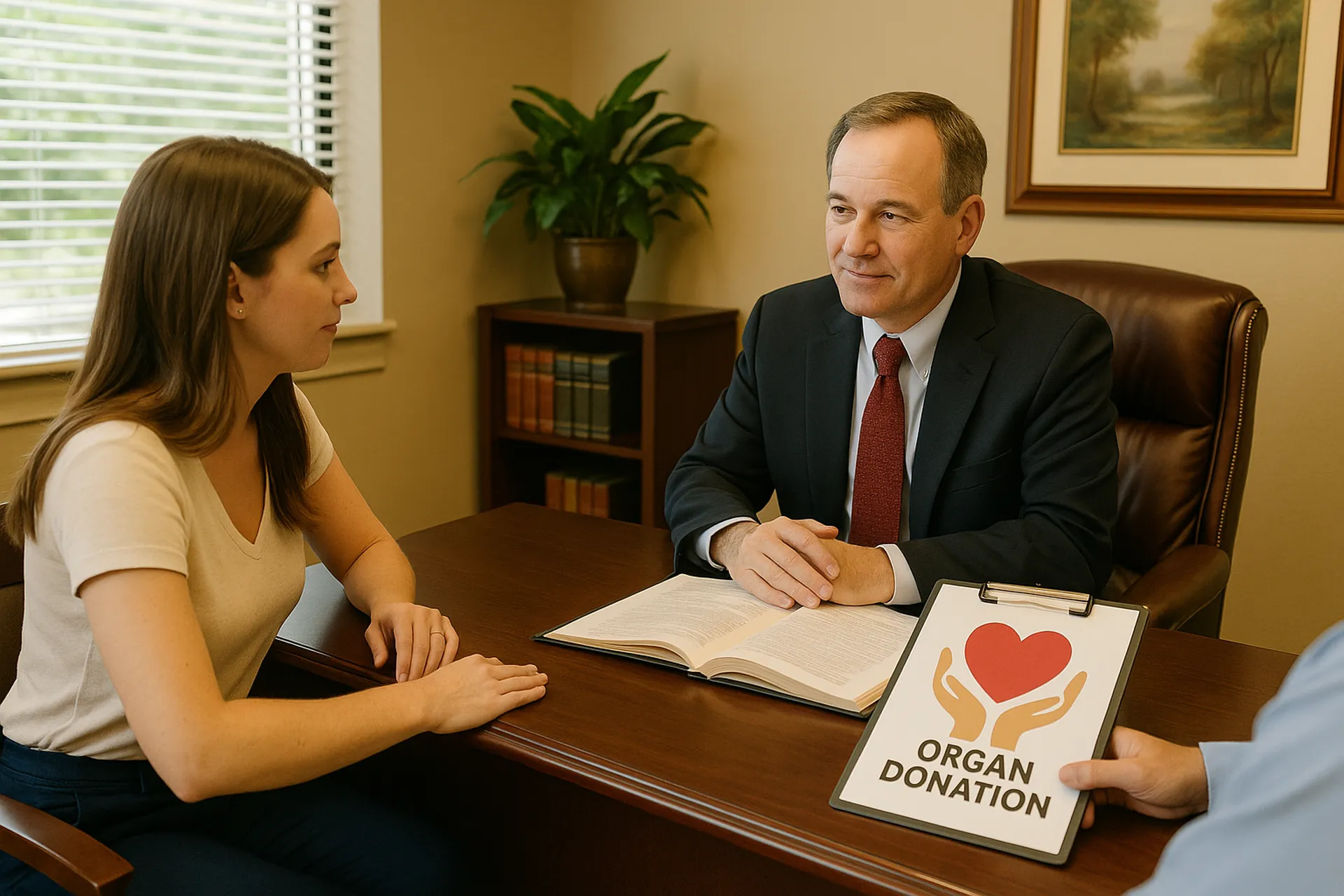Monday, October 27, 2025


When people think about estate planning, they often worry about the government taking a large portion of their life savings after they pass away. The good news is that for most Floridians, this fear rarely becomes reality. Thanks to Florida’s favorable tax laws and the high federal estate tax exemption, very few estates in Florida ever pay estate tax.
Florida Does Not Have an Estate or Inheritance Tax
Some states impose their own estate or inheritance tax, but Florida does not. No matter the size of your estate, there is no state-level death tax here.
Federal Estate Tax Rarely Applies
The federal government does impose an estate tax, but only on very large estates. As of now, the exemption is over $13 million per person, or more than $26 million for a married couple. That means fewer than one in a thousand estates across the country owe any estate tax at all.
Other Taxes Still Apply
It’s important to distinguish estate taxes from other kinds of taxes. While your estate is unlikely to owe estate tax, other taxes may apply in different contexts:
- Retirement accounts: Beneficiaries of IRAs and 401(k)s may owe income tax when they withdraw funds.
- Capital gains: Assets sold after death may be subject to capital gains tax, though rules about stepped-up basis often reduce or eliminate this tax.
- Everyday taxes: Floridians still pay sales tax, property tax, and federal income tax during life — but those are not estate taxes.
The Benefit of Stepped-Up Basis
One of the most important tax benefits at death is the step-up in basis. When someone passes away, most of their assets receive a new tax basis equal to the fair market value at the date of death.
- Example: If you bought a home in Sarasota for $150,000 years ago and it is worth $500,000 when you pass, your heirs inherit it with a basis of $500,000. If they sell it right away for $500,000, no capital gains tax is owed.This rule can save families thousands — or even hundreds of thousands — in potential capital gains taxes.
Why Planning Still Matters
Even if estate taxes are unlikely, planning is still essential. Probate, guardianships, and disputes among heirs can create costly delays and stress for families. A well-prepared estate plan helps avoid these problems and ensures your wishes are honored.
Conclusion
Most Floridians will never pay estate taxes at death, and many assets benefit from the step-up in basis. Still, a thoughtful estate plan is the best way to protect your family from unnecessary costs and complications. If you’d like guidance on how Florida’s laws apply to your situation, contact Bart Scovill, PLC today. https://scovills.com/?p=3000
Sunday, October 26, 2025
Monday, October 20, 2025


Many Floridians think of estate planning only in terms of wills, trusts, and financial matters. But there’s another gift you can leave that has nothing to do with money: the gift of life through organ donation. Making your wishes clear about donation is one of the most compassionate decisions you can make—and it can ease the burden on your loved ones during a very difficult time.
When Are Organs Donated?
Organs must be removed quickly after death to remain viable for transplant. In most cases:
- Brain death: Donation usually occurs after brain death, a legal and medical determination that all brain activity has permanently stopped. At that point, machines may keep the heart and lungs working only long enough for organs to be recovered.
- Cardiac death: In some cases, donation may occur after the heart stops, though fewer organs are suitable.
- Tissue donation: Even if organ donation isn’t possible, corneas, skin, and bone can often be donated for hours or days afterward.
Addressing Concerns About Premature Harvesting
Public concerns about “premature” organ removal have been fueled by urban legends and sensational headlines. In reality, Florida—and the entire U.S.—has some of the most stringent safeguards in the world:
- Independent confirmation: Two physicians not involved in transplantation must confirm death before donation can begin.
- Legal standard: Brain death is recognized as death under Florida law, supported by clinical tests and sometimes imaging studies.
- Separation of roles: The doctors caring for the patient are not the same doctors who recover organs.
- Oversight: The United Network for Organ Sharing (UNOS) and Florida organ procurement organizations tightly regulate every step.
These checks and balances make it extraordinarily unlikely—essentially impossible—for organs to be removed before true death is confirmed.
The Economics of Organ Donation
- No financial incentive: Families and donors receive no payment for organs. U.S. law makes it illegal to buy or sell human organs.
- Covered costs: Medical costs related to donation and transport are paid by the organ procurement organization, not the family.
- Public benefit: While there’s no direct financial incentive, organ donation reduces overall healthcare costs by allowing transplants instead of lifelong treatments like dialysis.
How to Put Your Wishes in Place
Floridians have several ways to ensure their donation decision is honored:
- Driver’s license / Florida ID: When you renew at the DMV, you can check a box to be added to the Joshua Abbott Organ and Tissue Donor Registry. This is the most immediate and widely recognized method.
- Estate planning documents: Include your wishes in your living will and health care surrogate designation. This makes your intent clear to family and healthcare providers.
- Communicate: Let your family know your decision so they can support it without doubt or conflict.
Conclusion
Organ donation is one of the most meaningful legacies you can leave behind. By making your wishes clear through Florida’s donor registry and your estate planning documents, you ensure your decision will be respected—and that your family won’t be left struggling with uncertainty.
If you’d like to learn how to incorporate your donation wishes into your estate plan, contact Bart Scovill, PLC. https://scovills.com/?p=2997
Saturday, October 18, 2025

On vacation and forgot to post my latest video. Here it is! https://youtu.be/MCjfYCThlBI?si=ozuy54LNLqyt4xtd
Monday, October 13, 2025


Creating an estate plan is a critical step to protect your assets and ensure your wishes are legally recognized. However, entrusting this task to an attorney who doesn’t focus on estate planning can leave important details overlooked. Even well-meaning attorneys in other practice areas may not have the depth of knowledge needed to navigate the complexities of estate law in Florida.
Why Experience in Estate Planning Matters
Estate planning involves more than drafting documents. It requires an understanding of issues such as legal capacity, asset transfers, probate avoidance, tax implications, and Florida-specific homestead and property laws. Attorneys outside this focus may unintentionally miss important provisions or fail to anticipate how your plan will function in real-life scenarios—especially during probate or trust administration.
How to Vet an Attorney’s Estate Planning Experience
Before hiring an attorney, it’s worth asking:
- What percentage of your practice is focused on estate planning? Look for a meaningful portion, not an occasional case.
- How many estate plans have you drafted and how many have you administered? Real-world administration experience is key to understanding how plans actually work.
- Have you handled cases involving complex family dynamics or unusual assets? This shows they can adapt documents to your unique situation.
- How do you ensure your clients’ plans remain current with changes in law or life circumstances? Ongoing attention is vital.
Why These Questions Matter
An estate plan that’s incomplete or poorly designed can lead to confusion, delays, unnecessary expenses, and even disputes among family members. A seasoned estate planning attorney is more likely to foresee potential pitfalls and structure your plan to avoid them. By asking the right questions, you can feel confident that your attorney has the focus and experience to protect your wishes.
Conclusion
Estate planning is too important to leave to chance—or to someone without significant experience in the field. Choosing an attorney who concentrates on estate planning and has a track record of guiding plans from creation through administration will give you peace of mind. If you have questions about your current estate plan or need guidance on creating one, contact Bart Scovill, PLC to ensure your legacy is in capable hands. https://scovills.com/?p=2699
Monday, October 06, 2025


If you don’t create your own estate plan, Florida already has one for you. But relying on that plan is a lot like asking one estate planning attorney to prepare a single plan that will work for all 23 million Floridians. It’s not designed for your specific needs—it’s designed for the average situation. And you probably don’t want to be treated as average when it comes to your family, your property, and your health care.
A complete estate plan lets you decide how things are handled. Florida’s statutory alternatives take that control away. Below, we’ll walk through what a comprehensive estate plan includes and what happens if you leave it to the state.
Trust vs. Intestate Probate
A revocable living trust allows you to manage and distribute your assets without the need for court intervention. It can avoid probate entirely and offer privacy, speed, and control over how and when your beneficiaries receive their inheritance.
If you don’t have a trust (or even a will), your estate goes through intestate probate. That means the Florida probate court uses the state’s laws to decide who inherits your property. Your spouse and children (or other blood relatives) will receive shares of your estate based on a legal formula—not based on your wishes.
Will vs. No Will
Even if you have a trust, you still need a will—specifically a "pour-over will" to catch any assets not titled in your trust. A will also allows you to name a personal representative to handle your estate and nominate guardians for your minor children.
If you die without a will, the court chooses your personal representative and decides who gets what under Florida’s intestacy laws. And if you have minor children and haven’t nominated guardians, the court will make that decision too.
Durable Power of Attorney vs. Guardianship of Property
A durable power of attorney lets someone you trust manage your finances if you become incapacitated. It’s a private, flexible way to handle incapacity without court involvement.
If you become incapacitated without a durable power of attorney, your loved ones may need to go through a guardianship of the property proceeding—asking a judge to appoint someone to manage your financial affairs. This process is costly, slow, and puts your financial life under ongoing court supervision.
Health Care Surrogate & Living Will vs. Guardianship of the Person
A health care surrogate designation allows you to name someone to make medical decisions on your behalf if you cannot do so. A living will gives guidance about your wishes for end-of-life care.
If you don’t have these documents, Florida law allows a “proxy” to make decisions for you—usually starting with a spouse, then adult children, parents, and so on. But if family members disagree, or if no appropriate proxy is available, a guardianship of the person may be necessary. That means a court proceeding where a judge decides who will make your medical decisions.
Pre-Need Guardian Designation vs. Uncertain Guardianship
A pre-need guardian designation tells the court who you want to serve as your guardian if one is ever needed. This helps avoid family disputes and gives the court a clear direction.
Without it, the court will decide who serves as your guardian, and that person may not be someone you would have chosen.
Your Estate Plan Should Be As Unique As You Are
Leaving things up to the state means accepting a one-size-fits-all solution. That might work for socks—not for your legacy. A custom estate plan ensures that:
- The people you trust are in charge
- Your property goes where you want it to
- Your wishes are followed during incapacity
- Your family avoids unnecessary legal battles and expenses
If you’re ready to create a plan tailored to your life—not Florida’s default—contact Bart Scovill, PLC. We’re here to help you take control of your future. https://scovills.com/?p=2552
Subscribe to:
Comments (Atom)


